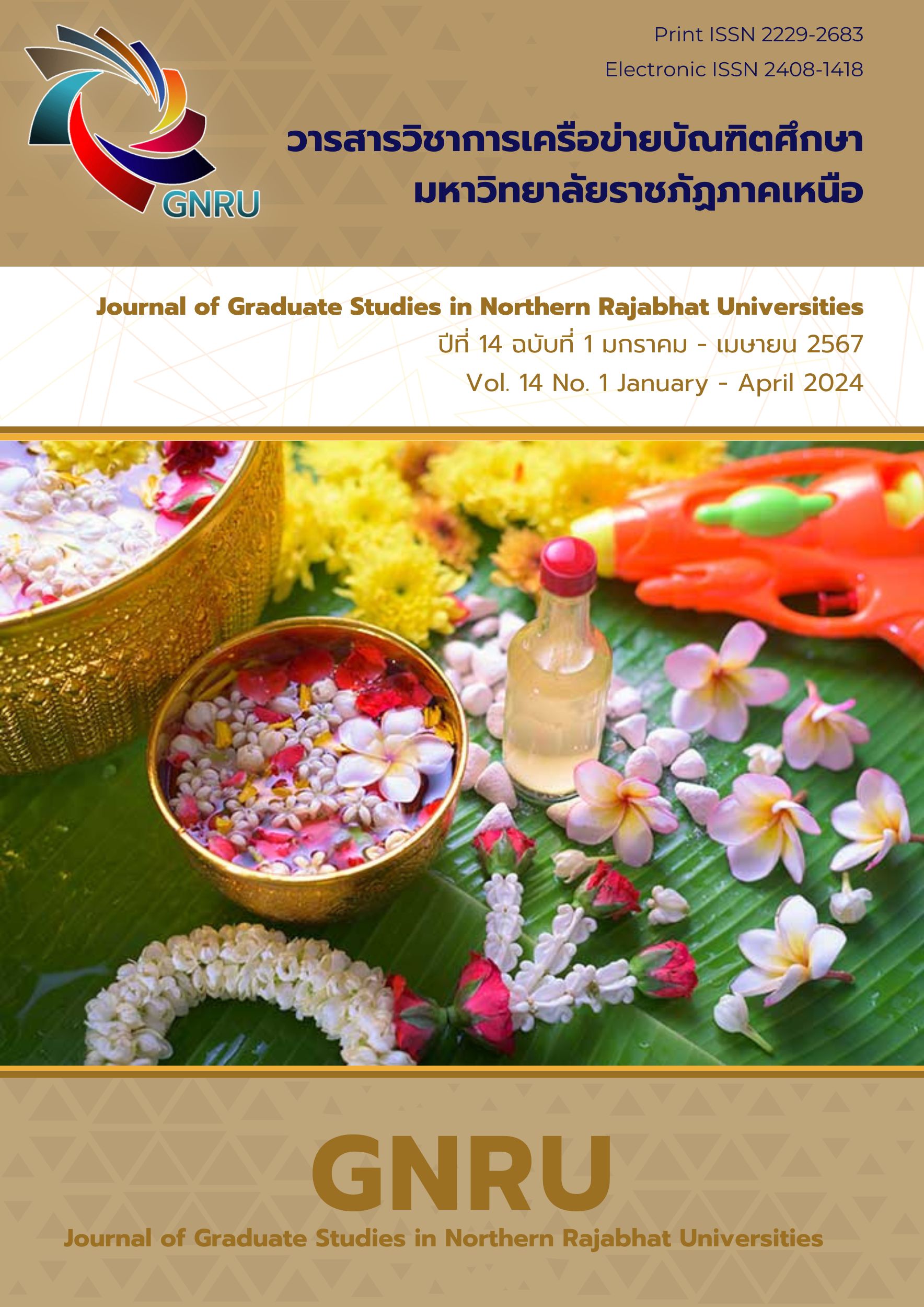10 การส่งเสริมพลังสุขภาพจิตสำหรับนักศึกษาพิการ
Main Article Content
บทคัดย่อ
พลังสุขภาพจิตหรือที่เรียกว่า อาร์คิว (RQ: Resilience Quotient) เป็นความสามารถในการปรับตัวและฟื้นตัวเมื่อต้องเผชิญกับความยากลำบากหรือภาวะวิกฤตในชีวิต สามารถผ่านพ้นและเรียนรู้จากเหตุการณ์นั้นๆ ได้ด้วยพลังใจที่เข้มแข็ง และดำเนินชีวิตได้อย่างมีความสุข ผู้ที่มีพลังสุขภาพจิตยังสามารถใช้วิกฤตเป็นโอกาส สามารถยกระดับความคิดจิตใจและการดำเนินชีวิตไปในทางที่ดีขึ้นหลังจากเหตุการณ์วิกฤตผ่านพ้นไป กรมสุขภาพจิตได้เสนอแนวทางในการส่งเสริมพลังสุขภาพจิต คือ แนวคิด ปรับ 4 เติม 3 ได้แก่ ปรับอารมณ์ ปรับความคิด ปรับการกระทำ ปรับเป้าหมาย และ เติมศรัทธา เติมมิตร เติมใจกว้าง นอกจากแนวคิดดังกล่าว การส่งเสริมพลังสุขภาพจิตยังทำได้อีกหลายแนวทาง เช่น การวิจัยพัฒนาด้านการส่งเสริมพลังสุขภาพจิต การจัดกิจกรรมส่งเสริมพลังสุขภาพจิตสำหรับนักศึกษาพิการ การส่งเสริมพลังสุขภาพจิตโดยการสนับสนุนจากครอบครัว จากครู และจากชุมชน เป็นต้น จุดมุ่งหมายของบทความนี้เพื่อนำเสนอความหมายและองค์ประกอบของพลังสุขภาพจิต แนวทางในการเสริมสร้างพลังสุขภาพจิตให้กับนักศึกษาพิการ เพื่อให้เขาสามารถผ่านพ้นอุปสรรค ปรับตัว และฟื้นตัวได้หากเผชิญกับปัญหา มีมุมมองทางบวก เกิดภูมิคุ้มกันด้านจิตใจ และดำเนินชีวิตได้อย่างมีความสุข นอกจากนั้นผู้สอน ผู้เกี่ยวข้องและสถาบันอุดมศึกษา ยังสามารถนำไปใช้เป็นแนวทางในการส่งเสริมพลังสุขภาพจิตสำหรับนักศึกษาพิการต่อไป
Article Details
เอกสารอ้างอิง
American Psychological Association. (2024). Resilience. Available on https://www.apa.org/topics/ resilience (retrieved 9 April 2024).
Arunruang, P. (2002). Effects of Group Counseling on Resilience and Coping Strategies of Early Adolescents. [Master of Arts]. Chulalongkorn University.
Choochom, O. (2011). Antecedents and Consequences of Youths’ Psychological Immunity. Bangkok: Behavioral Science Research Institute, Srinakharinwirot University.
Daengsuwan, K. (2012). Assistances for Disabled Students in Higher Education Institution: A Case Study of One of Rajabhat Universities in Southern Thailand. Bangkok: Health Systems Research Institute.
Davydov, D. M., Stewart, R., Ritchie, K., & Chaudieu, I. (2010). Resilience and mental health. Clin Psychol Rev, 30(5), 479-495.
Department of Mental Health, Ministry of Public Health. (2011). Tolerate Resolve Fight in Adolescence. Available on http://www.dmh.go.th (retrieved 14 November 2011).
Department of Mental Health, Ministry of Public Health. (2020). Change Bad to Good. Nonthaburi: Beyond Publishing.
Faculty of Psychology, Chulalongkorn University. (2023). Resilience. Available on https://www.psy.chula.ac.th/th/feature-articles/resilience (retrieved 9 April 2024).
Grotberg, H. E. (1995). A guide to promoting resilience in children: Strengthening the human spirit. Netherlands: Bernard van LeerFoundation.
Hassani, P., Izadi-Avanji, F. S., Rakhshan, M., & Majd, H. A. (2017). A phenomenological study on resilience of the elderly suffering from chronic disease: a qualitative study. Psychology Research and Behavior Management, 10, 59-67.
Kerdcharoen, N., Kolkijkovin, V. and Thaworn, J. (2021). Resilience, Mental Health Impact and COVID-19 Related Mental Health Determinants among Medical Students during COVID-19 Epidemic. Vajira Medical Journal: Journal of Urban Medicine, 65, 102-116.
Kietchaiyakorn, T. (2011). Relationship Between Adversity and Resilience Quotient and Stress of a secondary School Students. [Master of Science]. Chiang Mai University.
Layrayapong, P. (2018). The Whisper of Disabled. Burapha University.
Lynn, C., & Lane, D. (2010). Tracing the pink ribbon: Development of a family resilience measure. Doctoral dissertation. Human Development, Graduate Study, Virginia Polytechnic Institute and State University. Available on http://www.studentsuccess.unc.edu/ files/2015/08/The-Road-to-Resiliency.pdf (retrieved 2 January 2023)
Ministry of Education of Thailand. (2003). National Education Act B.E. 2542 and Amendments (No.2) B.E. 2545. Bangkok: Express Transport Organization.
. (2009). Regulations of the Committee for the Promotion of Education for Persons with Disabilities Concerning the Provision of Higher Education for Persons with Disabilities, 2009. Available on http://law.m-society.go.th/ law2016/law/view/445. (retrieved 2 January 2023)
. (2013). Education Provision for Persons with Disabilities Act B.E. 2551 and (No.2) B.E. 2556. Available on https://rb.gy/zpib3c. (retrieved 9 April 2024)
National Statistical Office. (2023). The 2022 Disability Survey. Bangkok: n.p.
Netasit, A. (2013). The Development of Resilience Quotient (RQ) Support Activities Set for Disabled Students. Proceedings of The Asian Conference Psychology & the Behavioral Sciences, 543-553.
Netasit, A. (2020). The development of resilience activity set for elderly people by using family and community as a basis. Journal of Mental Health of Thailand, 28(4), 327-336.
Nintachan, P. (2011). Resilience and Stress Among Nursing Students at Ramathibodi School of Nursing. The Journal of Psychiatric Nursing and Mental Health, 25(1), 1-13.
Panthu, K. (2000). Factors Effecting the Self-reliance of People with Disabilities. Bangkok: Thammasat University.
Phantong, K. (2020). Enhancing Resilience and Coping Strategies for Cyberbullying in Adolescence Using Mindfulness-Based cognitive Therapy Through Group Counseling. Behavioral Science Research Institute, Srinakharinwirot University.
Phayathai Independent Living Center for Persons with Disabilities. (2012). Background. Available on http://www.give2all.com. (retrieved 30 December 2022)
Sansuk, T. (2008). Resilience Experiences of Elderly in Tsunami Disaster. [Master of Nursing]. Chulalongkorn University.
Siriratrekha, T. (2006). Art Therapy Program Rajanukul Institute. Bangkok: Ladprao Teachers' Council Printing House Bibliography.
Talma, S. G. (2001). Resilience and social work practice: Three case studies. Families in Society, 82(5), 441-450.
Tantipiwatanaskul, P. (2007). Enhancing Resilience of Bullying High School Students by Cognitive Behavior Counseling Group. Nonthaburi: Department of Mental Health.
Thoongkaew, P. (2020). The Study and Development of Model a Strengthen Resilience and Rehabilitation Integrated of Teachers and Educational Personnel on New Normal. Bangkok: Ministry of Education.
Udomratn, P. (2009). Schizophrenia. Songkhla: Chanmoung Printing.
Wachiradilok, P. (2014). Resilience quotient of nursing students at SuanDusit Rajabhat University. Bangkok: SuanDusit Rajabhat University.
Wongsaparn, O. (2559). Buddhist Methods for Building Immunity to Face Crises. Graduate School, Mahachulalongkornrajavidyalaya University.


